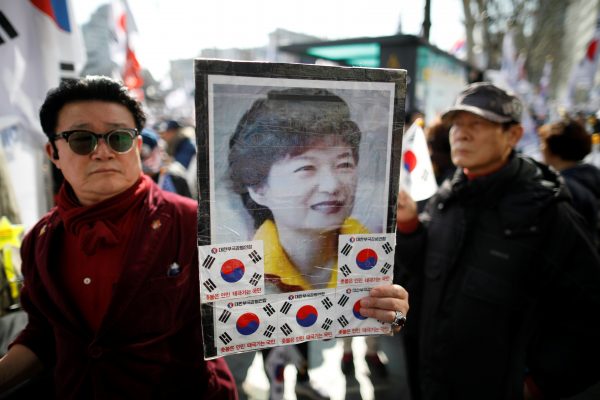Park is the first democratically elected South Korean president ever to be ousted by impeachment. In 2004, then-president Roh Moo-hyun was impeached by the National Assembly on charges of interfering with an election and of corruption among his associates, but the Constitutional Court overturned parliament’s decision and Roh was reinstated.
That case changed Roh’s political prospects almost overnight, with electorate backlash against his impeachment propelling his Progressive Uri Party to a victory in the National Assembly elections in April 2004. But Park’s impeachment has divided the country into pro-and anti-impeachment groups holding public rallies with either candles or national flags in central Seoul only tens of metres apart from one another every weekend since the initial candlelight vigil began in late October.
The feelings of conflict and confrontation between these two groups have been so intense that they both publicly declared they would not accept the Constitutional Court’s decision if it went against their position. Amid the divide between these two groups of younger generation, pro-impeachment progressives and older anti-impeachment conservatives, Park’s ruling Saenuri Party has split into the more reformative Bareun Party and the Liberty Korea Party.
Since the ruling, Park had offered no message of concession. Park’s lawyer, Seo Seog-ku, however, publicly condemned the ruling as ‘biased’, and thousands of Park’s angry supporters called for the repeal of her impeachment by staging a street parade.
In stark contrast, Kwon Seong-dong, the chairman of the parliamentary legislation and judiciary committee, applauded the Court’s ruling. The progressive newspaper Hankyoreh Sinmun in its 11 March editorial commended the ruling as the ‘victory of the “citizens’ revolution” which through months-long candlelight vigils ultimately brought about the ruling to confirm the rule of law and democratic values’.
So what does this mean for South Korea’s domestic politics?
The country must hold a presidential election within 60 days, likely on 9 May.
Somewhat ironically, Park’s impeachment has helped Moon Jae-in of the Democratic Party of Korea to cement his lead as the front-runner in the presidential race. A former human rights lawyer and chief of staff to president Roh Moo-hyun, who committed suicide in 2009 amid an investigation into graft allegations, Moon was defeated by Park Geun-hye in the 2012 presidential election. Just as Park rose to power riding on lingering conservative nostalgia for her father, former president Park Chung-hee, Moon might well sail on to presidential victory riding on progressive nostalgia for Roh loosely known as the ‘Roh Moo-hyun phenomenon’.
This does not necessarily mean that Moon demonstrates effective political leadership or a set of clear plans that would mend the ideological division between progressives and conservatives. In terms of forging national reconciliation, especially through long overdue structural reform, Moon is yet to prove his governing credentials.
That said, revision of the constitution to end the current five year single-term presidential system appears likely whoever becomes the next president. This system has allowed every incumbent president the unbridled power of a so-called ‘imperial presidency’ since its promulgation in 1987. All presidential hopefuls have already promised to resolve this matter mainly because the majority of South Korean people, especially progressives, equate Park’s impeachment with the end of the outdated 1987 Constitutional system.
The conservative daily Choson Ilbo 11 March editorial argued that if the next president breaks his or her own promise of constitutional reform, South Korean people must instigate another ‘political impeachment’. Moon Jae-in went further by publicly promising that politicians must ‘meet the public needs reflected in the candlelight rallies first’, by which he meant addressing not only Park’s impeachment, but also the investigation and prosecution of Choi Soon-sil’s corruption allegations that involve 53 heads of large chaebols (family-owned conglomerates) including Samsung Electronics.
The issue of chaebol reform, especially to root out South Korea’s entrenched political–chaebol corruption by introducing tougher anti-graft laws, is a key election promise of the leading presidential candidates. Given that chaebols are regarded as public enemies by the majority of angry South Koreans, the bribery case of Lee Jae-yong of Samsung could become a test for the next president to demonstrate political leadership and will to execute chaebol reform once and for all.
Special prosecutors are reportedly in a rush to investigate Park Geun-hye, now an ordinary citizen, with a plan to end their investigation and indictment by early next month at the latest in order to prevent any possible impact on the coming presidential election, lest it be favourable to a particular party’s presidential candidate.
Unlike her star-like rise to the top as Park Chung-hee’s daughter and as South Korea’s first female leader, her departure is marred with disgrace, leaving her cult-like followers angry and in despair while the nation as a whole has been turned upside down. Park’s return to her own home in southern Seoul on Sunday evening appears to be far from the end of this extraordinary saga. Her refusal to make any comment on the ruling, but to release a statement on her stance that, ’I believe that the truth will be revealed without fail, albeit it will take time’, signals a long and arduous political journey not only for herself but for the South Korean people.
Hyung-A Kim is Associate Professor of Korea Politics at the School of Culture, History and Language, The Australian National University.

